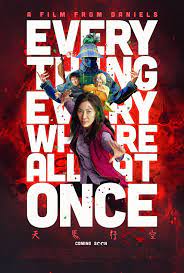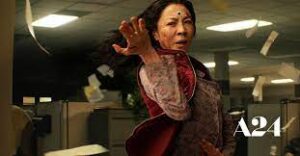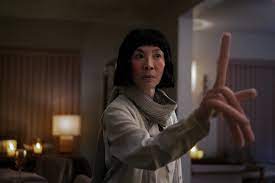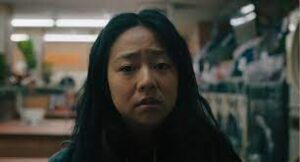
2022 was a unique year and kind of an inconsistent year for the Best Picture nominees. On the surface, it looked like the weakest batch of nominees in several years, but the films that were good were very good, and the others, well, they left something to be desired. There were a couple of films that a lot of cinephiles just loved and the general public greeted them with a general yawn. There were some films that were absolute blockbusters but were likely nominated more for the overall cinematic experience they provided rather than the overall quality of the films.
It seems fitting then, that a film like Everything Everywhere All at Once would take home the Academy’s top prize. It was a quirky, goofy, and sometimes gratuitous film that was released early in the year but stayed on everyone’s radar all the way through Oscar season. It didn’t hurt that there were a lot of behind-the-scenes feel-good stories to go along with it. It was the one film that critics and fans seemed to agree on, but, I couldn’t get more excited about it winning than saying, “Sure. I guess. I mean, I don’t know anything else that should have won.”

When I first saw it in the theater, I thought it was The Wizard of Oz meets any Marvel or DC superhero movie. Thematically speaking, there is a lot going on in this film, and I believe that is what separated it from the other nominees of 2022. Not that the other films were flat or without thematic elements. That’s not the case at all. But Everything Everywhere All at Once really nails a lot of very visceral feelings at the base levels. This film is primarily about the relationship between mothers and daughters, but there are also important components relating to wives and husbands. Underneath all of that is the component of regret. We all think about what our lives might be like if we had made one or two key decisions differently, or if one or two events in our lives had happened in different ways. We often believe that our lives would be better in those instances than they are now, so many of these feelings are aspirational. That is what separated Everything Everywhere All at Once from the other nominees. The thematic components that this film explored are more universal than any of the other films. This movie might not have been better than all of the other nominees, but it was absolutely more relatable.
In Everything Everywhere All at Once, Evelyn Wang (Michelle Yeoh) believes she’s living her worst life and all the lives that she sees in the parallel universes appear on the surface. Only through experiencing these lives that seem so much better, does she gain a better sense of, not only what she has in this life, but also what she’s been missing. To me, that is where the parallels to The Wizard of Oz show up. Dorothy hates the mundane life of Kansas, and longs to see what life is like “over the rainbow.” Once she experiences it, she realizes that “there’s no place like home.” Evelyn experiences that exact same character arc in Everything Everywhere All at Once. Directors Daniel Kwan and Daneil Scheinart also penned the screenplay and they did an outstanding job of creating conflict between what Evelyn wants and what she needs. What she wants is to have a better life financially. What she needs is to have better relationships with her husband and especially her daughter.

Another universal quality that EEAAO had was a very clear Hero’s Journey in the storytelling. The Daniels did a fantastic job of using the archetypes from The Hero’s Journey to create a story that resonates with a huge audience. Here’s why that’s important. This film is quirky. This film in some places is just downright weird. The hot dog fingers? The googly eyes? The rocks? I’m not even going to even talk about the stick up the butt. These are story components that no one should be able to relate to. These are story components that suggest this film is going after a niche audience and nothing more. And yet, because the Daniels adhered so closely to the tenants of the Hero’s Journey, audiences got this movie in a way that no reasonable person should have expected. Aspiring writers and filmmakers should use this film as a template, if for no other reason than to see how using the archetypes of the Hero’s Journey to make a film resonate with unexpected people.

Everything Everywhere All at Once had a good night on Oscar night. Aside from Best Picture it also won for Best Director, Best Editing, Best Screenplay, Best Actress, Best Supporting Actor, and Best Supporting Actress. While it deserved all of those wins, the acting should take special note. Many films have won Best Picture without winning acting awards, but a film is not going to win Best Picture without some superb acting, and this film is no exception. The acting was very good all the way around, and Everything Everywhere All at Once is worth watching just for the acting. There are some subtle moments that are just as engaging as the over-the-top performances. There is a scene that shows Evelyn’s daughter Joy crying in her car after a fight they had. It’s subtle, and it’s quick, but it feels so real and gut-wrenching like you can see years of pain and trying to satisfy a mother who can’t be satisfied in that look on her face. It’s the look of someone who has finally given up on ever having a good relationship with her mother. It’s a powerful moment. There is another moment when Evelyn’s father, Gong Gong finds out that Joy has a girlfriend. There is a constant worry that he won’t accept that due to his age and the fact that he’s old-fashioned. There is a moment of shock in his expression, but then there is acceptance and love, and James Hong played it masterfully. Both of those scenes are examples of visual storytelling that are all in the acting, and they are both brilliant.

Finally, and probably most importantly, this is an entertaining film. It was arguably the most entertaining film of the year, although a couple of the other nominees could arguably give it a run for its money. But coming out of the pandemic, we needed to be entertained. Anyone who has gone to a movie at an AMC theater over the last couple of years and seen that intro with Nicole Kidman over and over again knows what I’m talking about. Coming out of the pandemic, we needed to be entertained. We needed a movie that appealed to our need for fun. But at the same time, this film had some profound things to say, but it said those things with enough subtext that people got the message without even knowing they were being preached to. That is the mark of a truly great film. It can entertain and enlighten at the same time, and Everything Everywhere All at Once absolutely accomplished those goals.
Did the Academy get it right?
I am inclined to say that they did. Sometimes a movie winning Best Picture has just as much to do with timing as it does with it being an excellent film. Oscar history is filled with movies winning Best Picture that might not have been as good as the films they were nominated against, but they filled a societal need at the moment they came out. As mentioned above, it was a strange year, and the confluence of the end of the pandemic and all that entailed led for audiences to need affirmation that our relationships, strained though they are from social distancing or being locked together with our families, can be healed. A lot of people are struggling with a lot of challenges right now, and we need movies to show us that we’re not the only ones who are struggling and that those struggles ultimately will lead to something better. At its core, Everything Everywhere All at Once is a fantasy movie that allows audiences to have a little optimism that their worlds aren’t as bad as they think they are and that maybe the decisions from their past led them to where they should be.
Even though it wasn’t the strongest year for nominees, there were some very good films nominated. Full disclosure, I worked on Avatar: The Way of Water for four years. While it’s a visually stunning film and went on to become the third highest-grossing film of all time, it wasn’t the best picture of the year. It dragged in too many places and it was too long. Top Gun: Maverick was another highly entertaining film and likely only got nominated as a reward for rescuing theaters coming out of the pandemic. I thought it was a lot of fun and I didn’t have a problem with it being nominated, but I’m glad it didn’t win. Elvis was Baz Luhrman doing Baz Luhrman things. It was good and it was fun, and it was over the top, but not Best Picture worthy. All Quiet on the Western Front was almost my favorite film of the year. I was blown away by it until the end, which almost ruined it for me because it strayed so far from the book and the original version of the movie. In a vacuum, that’s no crime. Movies change the endings of books all the time, but changing the ending changes the entire message of the story, and for me, it was a distraction that almost took me out of the story. The Banshees of Inisherin was a movie I really wanted to like. I was a huge fan of In Bruges, but this movie was much different, and I wasn’t quite ready for it. Tar is one film that I just didn’t get. I went into it with high expectations. I wanted to love it. But the longer it went on, the longer I waited for it to get good, and it just never did. I didn’t love The Fablemans. I understand what Steven Spielberg was doing, but it didn’t work for me. I thought he left a lot of plays on the field, so to speak. Women Talking had some brilliant acting and was quite disturbing. It was filled with tension and was a worthy nominee. Triangle of Sadness started off really strong, but then it went off the rails.
Should you see it?
Yes, you absolutely should see Everything Everywhere All at Once. It’s wacky and quirky, but it has some universal themes that make it compelling and filled with emotion. It is entertaining and has a powerful message. It is worth your time.